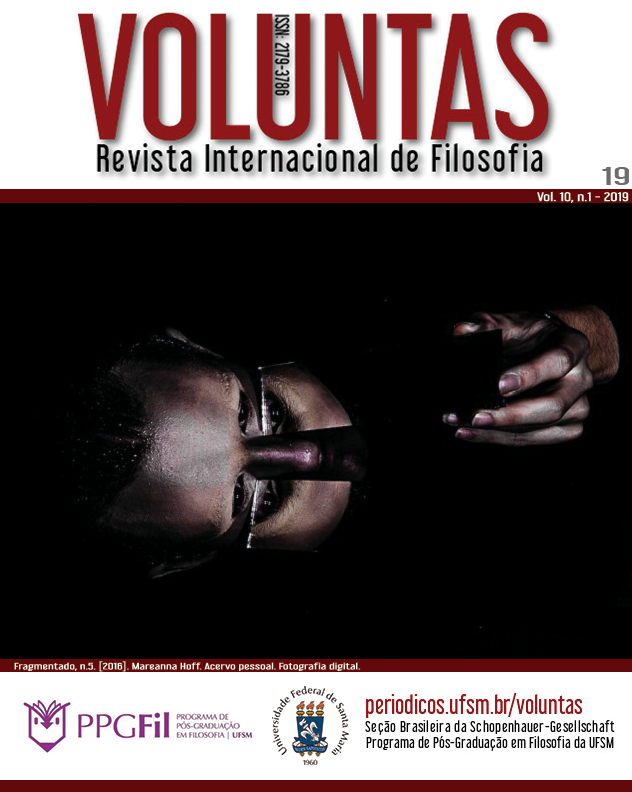Um sobretudo de argila: afetividade e normatividade na fenomenologia do corpo
DOI:
https://doi.org/10.5902/2179378637901Palabras clave:
Fenomenologia da espectralidade, Ancestralidade, Historicidade, Respeito aos mortos, HeideggerResumen
No presente artigo, examino o problema da normatividade na relação com a dimensão ancestral das possibilidades legadas pelos mortos. Seguindo o projeto de uma fenomenologia da espectralidade, apresentado por Hans Ruin, esboço uma interpretação de algumas indicações formais, presentes na analítica existencial de Ser e Tempo, a respeito da atmosfera (Stimmung) do ser-com-os-mortos. O sentimento existencial que manifesta uma sintonia já ocorrida com o âmbito da ancestralidade é o respeito (Ehrfurcht): respeito para com as possibilidades que podem ser retomadas no modo da réplica a uma herança. Da análise desse sentimento, resulta que a dimensão ancestral oferece a matéria da individuação histórica, mas não contém a medida da adequada resposta às possibilidades legadas. Concluo ressaltando que o aspecto autonoético do sentimento de respeito em relação às possibilidades ancestrais revela o abandono e a vulnerabilidade dos vivos em face a uma dimensão que comanda sem abrigar em si mesma uma medida da justa resposta.
Descargas
Citas
BAIER, A. Trust and Antitrust. In: BAIER, A. Moral Prejudices. Essays on Ethics. Cambridge: Harvard University Press, 1995, pp. 95-129.
BARASH, J. A. Heidegger and the Metaphysics of Memory. Studia Phaenomenologica, Bucharest, v. 8, 2008, pp. 401-409.
CARMAN, T. Heidegger. In: BERNECKER, S., MICHAELIAN, K. The Routledge Handbook of Philosophy of Memory. London/New York: Routledge, 2017, pp. 557-562.
FORD, A. Action and Generality. In: FORD, A.; HORNSBY, J.; STOUTLAND, F. (Eds.), Essays on Anscombe’s “Intention”. Cambridge: Harvard University Press, 2011, pp. 76-104.
FUCHS, T. Presence in absence. The ambiguous phenomenology of grief. Phenomenology and the Cognitive Sciences, Zurich, v. 17, n. 1, 2018, pp. 43-63.
GADAMER, H-G. Der Tod als Frage. In: Gesammelte Werke. v. 4. Tübingen: Mohr Siebeck, 1999, pp. 161-172.
HARRISON, R. P. The Dominion of the Dead. Chicago: University of Chicago Press, 2003.
HEIDEGGER, M. Anmerkungen I-V (Schwarze Hefte) 1942-1948. Frankfurt am Main: Vittorio Klostermann, 2015.
HEIDEGGER, M. Die Grundprobleme der Phänomenologie. Frankfurt am Main: Vittorio Klostermann, 1989.
HEIDEGGER, M. Hölderlins Hymne “Der Ister”. Frankfurt am Main: Vittorio Klostermann, 1993.
HEIDEGGER, M. Metaphysische Anfangsgründe der Logik. Frankfurt am Main: Vittorio Klostermann, 1978.
HEIDEGGER, M. Reden und andere Zeugnisse eines Lebensweges. Frankfurt am Main: Vittorio Klostermann, 2000.
HEIDEGGER, M. Sein und Zeit. Tübingen: Max Niemeyer Verlag, 1986.
KÄUFER, S. Heidegger on Mineness and Memory. Annales Philosophici, Oradea, v. 2, 2011, pp. 51-65.
MILCHERT, T. Christliche Wurzeln der Todesphilosophie Heideggers. Marburg: Tectum Verlag, 2012.
RATCLIFFE, M. The feeling of being. Journal of Consciousness Studies, Exeter, 2005, v. 12, pp. 43-60.
RATCLIFFE, M. Feelings of Being. Phenomenology, psychiatry and the sense of reality. Oxford: Oxford University Press, 2008.
REIS, R. Aspectos da modalidade. A noção de possibilidade na fenomenologia hermenêutica. Rio de Janeiro: Via Vérita, 2014.
RISSER, J. The Life of Understanding. Bloomington & Indianapolis: Indiana Univesity Press, 2012.
RODRÍGUEZ, R. (2015). La Interpretación Ontológica del Sentimiento Moral. In: RODRÍGUEZ, R. Fenómeno e Interpretación. Madrid: Tecnos, pp. 199-218.
RUIN, H. Spectral Phenomenology: Derrida, Heidegger and the Problem of the Ancestral. In: KATTAGO, S. The Ashgate Research Companion to Memory Studies. Farnham: Ashgate, 2015a, pp. 61-74.
RUIN, H. Housing Spirits: The Grave as an Exemplary Site of Memory. In: TOTA, A.; HAGEN, T. Routledge International Handbook of Memory Studies. New York: Routledge, 2015b, pp. 131-140.
RUIN, H. Anamnemic subjectivity: new steps toward a hermeneutics of memory. Continental Philosophy Review, Zurich, v. 48, 2015c, pp.197-216.
RUIN, H. Speaking to the Dead. Danish Yearbook of Philosophy, Leiden, n. 48-49, 2016, pp. 115-137.
RUIN, H. Being with the Dead. Burial, Ancestral Politics, and the Roots of Historical Consciousness. Stanford: Stanford University Press, 2018a.
RUIN, H. (2018b). Death, Sacrifice, and the Problem of Tradition in. Comparative and Continental Philosophy, London, v. 10, n. 2, pp. 140-150.
SLABY, J. (2008). Affective intentionality and the feeling body. Phenomenology and the Cognitive Sciences, Zurich, v. 7, pp. 429-444.
SLABY, J.; STEPHAN, A. (2008). Affective intentionality and self-consciousness. Consciousness and Cognition, Paris, v. 17, pp. 506-513.
SÓFOCLES. Antígona. Trad. Lawrence Flores Pereira. Rio de Janeiro: Topbooks, 2006.
THEUNISSEN, M. Das erbauliche im Gedanken an den Tod. Traditionelle Elemente, innovative Ideen und unausgeschöpfte Potentiale in Kierkegaards Rede An einem Grabe. Kierkegaard Studies Yearbook, Berlin, 2000, p. 73.
ZUCKERMAN, N. Heidegger and the essence of Dasein. The Southern Journal of Philosophy, Memphis, 2015, v. 53, n. 4, pp. 495-516.
Publicado
Cómo citar
Número
Sección
Licencia
La sumisión de los originales para este periódico implica la transferencia, por parte de autores, de los derechos de publicación impresa y digital. Los derechos autorales para los artículos publicados son del autor, con derechos del periódico sobre la primera publicación. Los autores sólo podrán utilizar los mismos resultados en otras publicaciones indicando claramente este periódico como el medio de publicación original. En virtud de ser un periódico de acceso abierto, está permitido el uso gratuito de los artículos en aplicaciones educacionales, científicas, no comerciales, desde que referenciada la fuente (por favor, vea la licencia Creative Commons en el pie de página de este periódico).







